These days, when we are feeling the summer heat more and more, not a day goes by without a development in the field of litigation. In our second issue of Esin Litigation Quarterly, we encapsulated the latest news and significant court decisions in the vibrant domain of international litigation.
This issue serves as an overview of the past three months, offering valuable insights into recent court decisions and news concerning litigation.
1. Significant court decisions concerning litigation
1.1 European Court of Human Rights rules that facial recognition technology constitutes unlawful processing of personal data.1
The European Court of Human Rights ruled that the processing of personal data by face recognition technology violates Article 8 and Article 10 of the European Convention on Human Rights. The case concerns the use of facial recognition systems in the Moscow subway line for arresting the applicant Mr. Glukhin. The ECHR ruled that Russia had interfered with Mr. Gulkin's right to privacy and freedom of expression
A life-size cardboard of an outrageous activist figure who received media attention was carried by Mr. Glukhin as he traveled the Moscow subway. The Russian authorities found images and a video of Mr. Glukhin's protest that had been posted on a public social media site while conducting standard internet surveillance. The Russian police claimed that the arrest and the use of the facial recognition system were not unlawful and were in compliance with the Russian Police Act. On the contrary, the Guidelines on Facial Recognition (2021) of the European Council and the European Union Directive 2016/680 on the protection of individuals regarding the processing of personal data suggested that the rules on biometric identification using facial recognition technologies for law enforcement purposes should only be allowed if it is strictly necessary and proportionate to achieve the purpose on a case specific basis and must be subject to appropriate safeguards for the rights and freedoms of the data subject.
The violations of Article 8 and Article 10 of the European Convention on Human Rights have been discussed by the court with respect to the unjustified processing of personal data and unjustified administrative offence conviction for Mr. Glukhin's failure to submit his request for a public demonstration prior to the act itself. First, regarding the violation of freedom of expression, the authorities appeared to not have considered whether the cardboard that the applicant used was an expression of his views and, moreover, they have also failed to substantiate the legal grounds for such interference. Secondly, regarding the violation of Article 8 on respect for private life, the use of the facial recognition system to identify a nondisruptive demonstrator could not have been regarded as strictly necessary and did not show any signs of respect to privacy. The ECHR emphasized that oth Article 8 and 10 are fundamental rights that must be respected in democratic countries. However, although the Russian authorities claimed that their purpose was for crime prevention, it was found by the court to be both disproportionate and intolerant.
1.2 The Constitutional Court rules that the right to residential immunity was violated by the Turkish Competition Authority (TCA) by on-site inspections conducted without a judicial decision.2
The Constitutional Court decided that the inspection that the Competition Board conducted without a judicial decision according to Law No. 4054 on the Protection of Competition violated the right to residential immunity of the applicant according to Article 21 of the Constitution.
Competition experts who were authorized to conduct preliminary investigations went to the applicant's address for an on-site inspection. In the report prepared by the rapporteurs of the Competition Board, it was concluded that the entrepreneurs, including the applicant, had committed acts in violation of Law No. 4054, and as a result, the Competition Board imposed an administrative fine.
Against this decision, the applicant sought the annulment of the regulation imposing the fines by filing a lawsuit before the Council of State. However, the Council of State dismissed the case, and the applicant's appeal to the Council of State Administrative Law Chambers had not been successful.
The applicant, taking the case to the Constitutional Court, claimed that the on-site inspection had violated the right to residential immunity. Regarding the right to residential immunity, the discussion had been shaped around the question of whether the workplace where the inspection was carried out is considered within the concept of residence. It was decided that the workplace should be considered as residence considering that not everyone can freely enter these places, and, since the inspection was done on the computers of the company, the inspection constituted an interference with the applicant's right to residential immunity. Moreover, this interference can be regarded as limiting certain fundamental rights such as the right to privacy.
Additionally, with regards to obtaining a judicial decision, there is an incompatibility between Law No. 4054 and Article 21 of the Constitution. Law No. 4054 neither requires a judge's decision for an inspection nor limits the inspection without a judge's decision where there is an imminent risk in case of delay (gecikmesinde sakinca bulunan haller). On the other hand, Article 21 of the Constitution requires a judge's decision to be obtained and requires, in cases where there is an imminent delay, a written order of the authority recognized by law instead of a judicial decision.
In reaching its decision, the Constitutional Court stated that section 15 of the Law No. 4054 violates Article 21 of the Constitution for not limiting the conditions for conducting an inspection to obtain a judicial decision whether there is an imminent delay or not. To sum up, although the violation of the residential immunity did not depend on the outcome of the trial, in order to prevent future violations due to the incompatibility of the two articles, the legislature could rectify the incompatibility of Law No. 4054 on the Protection of Competition and Article 21 of the Constitution.3
1.3 The Constitutional Court underlines that the refusal of an "restatement of claim (islah)," on the grounds that no restatement can be made after the reversal of the decision, violated the right to access to court and the right to a fair trial.4
The General Assembly of the Constitutional Court ruled in an individual application that the applicant's right to access the court and the right to a fair trial guaranteed by Article 36 of the Constitution were violated given that the applicant's request for a restatement of claim was rejected on the grounds that no such request could be made after the decision was reversed.
The application subject to the decision was brought before the Constitutional Court by the spouse of a workplace accident victim. The applicant filed a lawsuit, demanding pecuniary and nonpecuniary damages, without prejudice to her rights for exceeding damages. The first instance court, after evaluating the expert's report, stated that the material damage was covered by the income allocated by the Social Security Institution. This decision was reversed by the Court of Cassation on the grounds that the expert reports contradicted each other. Upon the annulment of the previous decision, the Court of Cassation ordered a new expert examination to resolve the contradiction and a new expert report was issued. The applicant then increased her claim for pecuniary damages according to the new reports, and the court accepted her claim. The Court of Cassation reversed this decision on the grounds that it was not possible to amend the claim after the reversal, in line with the previous decision of the Court of Cassation General Assembly on the Unification of Judgments dated 9 February 1948, file no. 1994/10, decision no. 1948/3. Upon this decision, the court adjudicated adhering to the amount initially demanded by the applicant, and the appealed decision was upheld by the Court of Cassation. The applicant filed an individual application to the Constitutional Court against this decision.
The Constitutional Court first emphasized that there is no binding rule preventing restatement of claims in the proceedings after the reversal decision. The court added that the "right to access to court" within the scope of the "right to a fair trial" should allow for the possibility to increase the claim amount by restatement of claim or other means. Consequently, the Constitutional Court ruled that the categorical interpretation made by the courts that it was not possible to make restatements after the reversal decision for all disputes significantly limits the "right to access to court," considering that these categorical interpretations are unpredictable and do not comply with the principle of legality in the constitutional sense. Indeed, if there are two different interpretations on a matter, the interpretation in accordance with the Constitution shall be preferred. In addition, with the amendment to the Code of Civil Procedure dated 28 July 2020, the legislator clearly regulated that if the first instance court takes an action regarding the proceeding after a reversal, restatement of claims can be made until the end of said proceeding. Thus, the Constitutional Court ruled its decision in line with the recent amendment made to the Code of Civil Procedure and established its view regarding the matter compatible both with the Constitution and the common practice adopted.
1.4 The Council of State General Assembly on the Unification of Judgments rules that in administrative cases, the intervening party (müdahil) may appeal against the decision alone, unless it is contrary to the will and statements of the party they have joined.5
The Council of State General Assembly on the Unification of Judgments has issued a ruling stating that in administrative cases, if the party joined by the intervening party does not apply for an appeal, the intervening party is entitled to seek legal remedies against the decision independently, unless it goes against the wishes and statements of the party they have joined. However, the court must notify the joined party of the application.
To resolve the discrepancy between the decisions of the Council of State's case departments and committees on the issue of whether the intervening party can appeal on its behalf if the party with whom the intervening party has joined does not appeal, a decision of unification of case laws has been issued. The General Assembly of the Council of State stated that, after the abolition of the provision of the Code of Civil Procedure No. 1086 that required the intervening party to act jointly with the party, and the enactment of the new procedural law, the emerging opinion in the doctrine was that the intervening party may appeal alone. However, there was a difference of opinion among different chambers of the Council of State. While some chambers were of the opinion that the intervening party cannot appeal against a decision without the consent of the party they joined, others argued that it should be possible for the intervening party to seek legal remedies against an unfavorable decision as much as the initial party does not oppose.
Evaluating the right to intervene in the lawsuit within the scope of the right to access to court, the Council of State General Assembly on the Unification of Judgement stated that Article 36, paragraph 1 of the Constitution stipulates that everyone has the right to a fair trial as a plaintiff or defendant before the judicial authorities by using legitimate means and ways. Within this framework, since the subject of the right to a fair trial is "everyone," including the intervening party, who is positioned next to the party, they should also benefit from the right to have a fair and equitable trial, to access the court, to request judicial protection and to be heard legally. The General Assembly also stated that in administrative proceedings, the principle of ex officio examination applies and therefore the judge is not bound by the evidence submitted by the parties. As a matter of fact, in administrative proceedings, intervention in the case is also possible with the decision of the judge without the request of the parties. Therefore, civil and administrative proceedings should be evaluated by taking these differences into consideration. In this respect, as long as the intervention of the third party is not contrary to the transactions or statements of the party with whom he/she participated, the decision can be appealed alone. Finally, the Council of State General Assembly on the Unification of Judgement added that this application made by the intervening party must also be notified to the party.
1.5 The Constitutional Court rules that the correction of judgment (tavzih) violates the right to a fair trial if it changes the decision to the detriment of one of the parties.6
In its newly published individual application decision, the Constitutional Court ruled that the acceptance of a party's request to clarify an ambiguity in a final court decision violated the right to a fair trial of the party against whom the decision was changed.
In the dispute before the Constitutional Court, the tenant was found to be right regarding a royalty agreement ("Royalty Agreement") between the parties. The applicant filed a lawsuit for compensation for damages arising from the breach of the Royalty Agreement. The first instance court partially accepted the applicant's claim and ruled that the Royalty Agreement between the parties was valid, but rejected the applicant's claim for compensation on the grounds that the conditions were not met. The parties appealed. The Regional Court of Appeal accepted the appeal and annulled the decision. The Regional Court of Appeal ruled that the Royalty Agreement was invalid and that the "leased" mining site should be handed over to the applicant. The Regional Court of Appeal decision was put to execution by the applicant. However, the other party objected to this decision, arguing that in fact the applicant should not be handed the entire site but only a certain part of it, the coordinates of which were determined in accordance with Article 2 of the Royalty Agreement. However, the execution court stated that a decision had already been made and that it could not decide on this issue.
The opposing party then requested that the Regional Court of Appeal clarify its decision. The opposing party stated that according to Article 2 of the Royalty Agreement, only the part whose coordinates were determined constituted the subject matter of the contract, whereas the applicant had applied for execution for the entire license area in bad faith. The Regional Court of Appeal decided to revise the decision and ruled in favor of that the delivery of the area whose coordinates were determined in accordance with Article 2 of the Royalty Agreement.
The applicant then filed an individual application on 7 June 2020. The applicant also filed an appeal, which the court dismissed on the ground that "an amendment of a judgment, the original of which cannot be appealed, cannot be made subject to an appeal."
In its examination, the Constitutional Court decided that the applicant's claim before the Regional Court of Appeal was for the whole area and that the court accepted the claim in full, not in part. Moreover, the Constitutional Court stated that there was no indication in the aforementioned judgment that the term "leased" was limited to the area whose coordinates were given in the Royalty Agreement. On the other hand, it has been observed that the Regional Court of Appeal, in its decision of correction, decided to limit the terms to the specified coordinates. Accordingly, the Constitutional Court stated that with the decision of the Regional Administrative Court, the content of the Royalty Agreement was reinterpreted and a new judgement was established in such a way as to change the content of the first judgement, and concluded that this approach of the Regional Court of Appeal exceeded the boundaries of the mechanism of clarification, which is a way to be resorted to voluntarily only in when there is a valid reason, and reached the dimension of redetermining the scope of the agreement. The Constitutional Court thereby ruled that the correction decision constituted a violation of the "principle of inviolability of the res judiciata" and therefore, the Article 36 of the Constitution, right to a fair trial, was violated.
In its application to the Constitutional Court, the applicant also requested the renewal of the trial regarding the decision of reconsideration. In the examination of the Constitutional Court, it was ruled that there was a legal interest in a retrial in order to eliminate the consequences of the violation of rights identified in the application, and, therefore, it should be held.
It should also be noted that there four of the presiding judges submitted their dissenting opinion to the decision. In their dissenting opinions, it was stated that the term "leased" in the phrase "delivery of the 'leased area' to the applicant" used in the Regional Court of Appeal's decision was ambiguous. In other words, it was not understood that the entire leased area was meant here, and it was precisely for this reason that the opposing party requested a clarification. It was stated that because the Regional Court of Appeal resolved the doubts and clarified the provision, the interpretation of the contract was in question here, and therefore, the Regional Court of Appeal's decision was not arbitrary and did not contain an obvious error of discretion.
1.6 The Court of Cassation Grand General Assembly on the Unification of Judgments rules that, for the collection of receivables secured by pledges and bills of exchange, the debtor cannot be prosecuted simultaneously through foreclosures of the pledge and foreclosure through bills of exchange.7
The Court of Cassation Grand General Assembly on the Unification of Judgments stated that the creditor cannot simultaneously foreclose the pledge and apply for foreclosure through a bill of exchange for a receivable that is both secured by a pledge and a bill of exchange. With this decision, if a debtor is prosecuted simultaneously through both foreclosure of the pledge and foreclosure through bills of exchange, they may always apply to the enforcement court by way of complaint and request the cancellation of the second foreclosure initiated against them.
Under Article 45 of the Enforcement and Bankruptcy Code (EBC), when a receivable is secured by a pledge, the creditor must first pursue the foreclosure of the pledge before the seizure of the debtor's unpledged goods. Moreover, under Article 167/1 of the EBC, which is an exception to this rule, in pursuit of a receivable that is both secured by a pledge and also attached to a bill of exchange, foreclosure may be carried out directly through the bill of exchange.
There was a difference of opinion among the chambers of the Court of Cassation as to whether the creditor, in pursuit of a receivable that is both secured by a pledge and a bill of exchange, can foreclose the pledge and the bill of exchange at the same time. While the 12th Civil Chamber of the Court of Cassation was of the opinion that the creditor must choose only one of the two methods of enforcement, the Court of Cassation General Assembly of Civil Chambers, the 11th, 13th and (closed) 19th Civil Chambers of the Court of Cassation were of the opinion that the creditor may apply for both foreclosure of the pledge and foreclosure through bills of exchange at the same time. With the Unification of Judgments Decision, these differences of opinion were resolved, and it was decided that the debtor cannot be prosecuted simultaneously through both foreclosure of the pledge and bills of exchange.
In the reasoning of the Unification of Judgments Decision, The Court of Cassation Grand General Assembly on the Unification of Judgements stated that under Article 167/1 of the EBC, the option to apply for foreclosure through bills of exchange in receivables protected by pledge, does not mean that two attachment procedures can be applied at the same time. A second proceeding against the same debtor for the same receivable is contrary to the principle of a single proceeding for the same receivable in the enforcement and bankruptcy system. The Court of Cassation Grand General Assembly also emphasized that this decision is in line with Constitutional Court's decision dated 22 April 2015, with the file no: 2015/28 and decision no: 2015/42, stating that compulsory enforcement (cebri icra) should be envisaged as a last resort.
The Court of Cassation Grand General Assembly stated that applying two execution systems together disrupts the balance of interests between the debtor and the creditor, on the grounds that the seizure of the debtor's unpledged goods, without the issuance of a temporary pledge deficiency certificate, creates an excessive burden for the debtor, and the creditor's pursuit of the same receivable for the second time causes the debtor to incur additional enforcement costs and attorney fees. The court also added that the creditor had no legal benefit in the second enforcement proceeding and that the second enforcement proceeding unnecessarily occupied the enforcement offices.
2. Statistics and other news concerning litigation
2.1 Statistics
In the previous issue of Esin Litigation Quarterly, we shared the judicial statistics for 2022 and observed how busy the courts were that year. According to the statistics, the criminal chambers of the courts of first instance ranked first in terms of workload with a total of 3,303,740 files. In the regional courts of appeal, they ranked second after the civil chambers with 966,921 files.8 This time, the Ministry of Justice published the Prison Statistics for the year 2022 and published statistics on the number of people in prisons in Türkiye by year and their distribution by gender. As can be seen from the statistics, the workload of the courts is directly proportional to the number of people in prisons. Let's take a closer look at these statistics.
(a) Number of people in prison
The number of people registered in prisons, including those on probation, on 31 December 2022 was 341,294, reflecting an increase of 14.6% compared to 2021. The graph below shows the total number of people in prison in 2022, regardless of what year they entered prison. On the other hand, the number of people who were put in prison in 2022 is 310,410. Of this number, 1,373 were children.
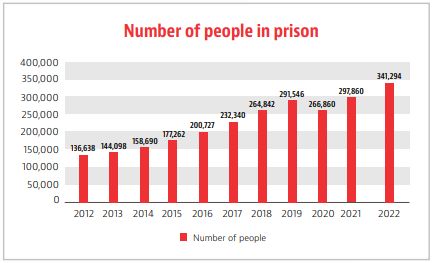
(b) Diversity in judiciary in Türkiye
As can be seen from the pie chart below, the number of men in prison is considerably higher than the number of women.
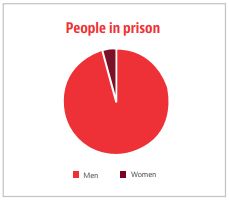
(c) Distribution of the most common crimes committed by people who are in prison
According to the ranking, the most common crime committed by those in prison in 2022 was robbery, while the least common crime was damage to property.
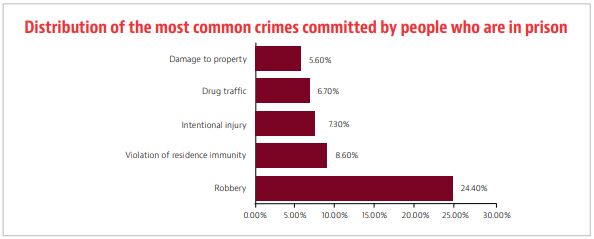
(d) Proportion of people entering and leaving prison
As seen in the graph below, since 2020 there have always been more people who have entered prison than those who have left.
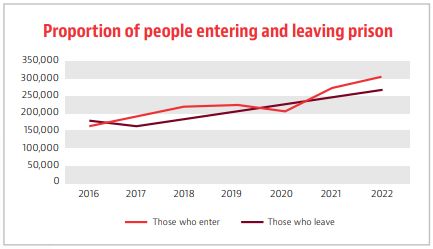
2.2 Other news concerning litigation
(a) Decree on the Redetermination of the Amounts of Fixed Fees in the Tariffs Related to the Law No. 492 on Fees has been published in the Official Gazette.
With the Presidential Decree numbered 7344 published in the Official Gazette numbered 32241 and dated 7 July 2023, it has been decided to put into effect the Decree on the Redetermination of the Amounts of Fixed Fees in the Tariffs Related to the Law No. 492 on Fees ("Decree"). Pursuant to the Decree, the fixed fees, including the minimum and maximum amounts of fixed and proportional fees, have been increased by 50%, except for certain fees included in the Fees Law No. 492 ("Fees Law"). The Decree entered into force on 8 July 2023. Also, the General Communiqué on the Law on Fees (Serial No. 93) ("Communiqué") was published in the Official Gazette dated 13 July 2023 and numbered 32247 and the updated fee amounts were announced within the scope of the Communiqué.
In the light of this increase in the lump sum fees in the Fees Law, the amounts of fees for civil lawsuits that involve the subject matter of money and are decided on the merits have been updated as follows.
For civil lawsuits that involve the subject matter of money:
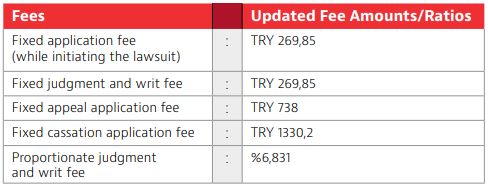
(b) MetaBirkin Non-fungible token (NFT) sales have been stopped by a New York judge, a significant victory for Hermès.9
A New York judge has ordered a permanent injunction prohibiting all sales of the MetaBirkin NFTs, marking a significant legal victory for luxury brand Hermès.
The French company and the artist Mason Rothschild, who produced the NFT collection with depictions of Hermès Birkin bags under the name MetaBirkins, were involved in a legal dispute. Hermès alleged that the NFT collection violated its trademark, but Rothschild claimed that the artistic expression is protected by the First Amendment. On the other hand, Mason Rothschild stated that an artist's First Amendment rights prevail over a trademark owner's right to prevent the use of its mark in the title of an artwork so far as the name is 'minimally' artistically relevant to the product and the use does not explicitly mislead as to the content, sponsorship, endorsement or authorship of the work. However, the court found Rothschild liable for trademark infringement, dilution and cybersquatting in February, agreeing with Hermès.
Subsequently, Hermès filed a second lawsuit in March seeking a long-term injunction to stop further sales of the NFTs, since Rothschild persisted in promoting and selling them despite the judgment. In its ruling, the judge ruled that Rothschild used variations on Hermès trademarks with the intent to mislead consumers into supposing that Hermès sponsored the MetaBirkins NFTs. Furthermore, it is ruled that the misleading approach renounced the artist's rights to First Amendment protection. The judge noted that freedom of speech protections under the First Amendment would generally apply to creative expression but, in this case, Hermès' evidence that Rothschild purposefully misled investors overrode that protection.
The controversy about the legal standing of NFTs has been rekindled by the court case involving the MetaBirkin NFTs. Previously, artists had thought that labeling their NFTs as 'artistic expression' would protect them from intellectual property infringement charges. However, the court's decision emphasizes that NFTs have value and are covered by intellectual property regulations.
The decision establishes a precedent by showing that exploiting trademarks to promote NFTs misleadingly can result in legal repercussions, even if the works assert that they are artistic expressions protected by the First Amendment.
(c) Burford and Sysco's legal dispute is over after both sides have rejected all accusations.10
As we mentioned in the previous issue of the Esin Litigation Quarterly, there was a dispute between the American multinational marketing and distribution company Sysco and the major litigation funding company Burford Capital over a USD 140 million loan for Sysco's antitrust claims. Burford, which funded Sysco's legal proceedings, allegedly controlled the litigation decisions and rejected settlement offers that it found "too low" in conspiracy with Sysco's representatives. Rather than considering Sysco's benefit and accepting settlement deals, Burford was accused of seeking more lucrative deals to get higher commission fees, and leading Sysco to initiate legal proceedings. However, in settling the dispute, Sysco decided to focus on the business and give full authority to Burford to carry out the legal proceedings in its antitrust case. Burford, which was accused of partially controlling Sysco's case, ended up getting full control of the case that it funded. Although both parties agreed to drop all their claims against one another, this case raised concerns and criticisms with regard to the improper control that investment funds exercise on the cases and parties that they fund.
(d) LegalPay announces a second interim financing exit in SARE Gurugram with 23% returns.11
LegalPay, one of the largest litigation funding platforms that also offers interim investment models to companies under insolvency, exited successfully from its investment in the interim finance segment for the second time with a 23% internal rate of returns. The investment was given to SARE Gurugram, a real estate company in insolvency, for it to carry out the necessities of its business and protect its assets until an insolvency resolution plan is approved to revive the company. In April 2023, SARE Gurugram had a debt resolution plan approved by the National Company Law Tribunal, which will help to pay its debts and keep the company away from insolvency. With the interim investment models that it provided, LegalPay not only assisted SARE Gurugram significantly but also generated a 23% return of investment, a move that can be said to have resulted in mutual profit.
(e) Stonward becomes a member of the European Litigation Funding Association (ELFA).12
Stonward, a litigation funder operating in Spain and Latin America, joined the European Litigation Funding Association (ELFA), an association founded by litigation funders with a European footprint which funds the commercial litigation industry in Europe. Stonward, with a focus on Spain, aims to contribute to the main purpose of ELFA which is to become the collective voice of litigation funding in Europe. By funding the litigation costs of clients in Europe, both ELFA and Stonward play an active and significant role in shaping the future of litigation, providing their clients with access to justice and support in establishing effective dispute resolution systems. With litigation funders such as Stonward joining, ELFA keeps growing and expanding which benefits the organizations in need of funding to pursue litigation as a way of dispute resolution.
(f) Türkiye's Financial Crimes Investigation Board (MASAK) tightens its grip on the credit card frauds conducted through social media influencers in social media intermediaries.
Last month, Turkish officials from the Financial Crimes Investigation Board initiated an investigation concerning fraudulent activities taking place via social media intermediaries. In the investigation, the officials determined that (i) through the use of social media and stolen or otherwise illegally obtained credit cards, the suspects, (ii) schemed with so-called influencers (some of whom have millions of followers), (iii) resorted to violence and (iv) tried to give a legal appearance to the income obtained by sending specific social media intermediaries' tokens during the broadcast. Moreover, in the Financial Crimes Investigation Board's reports, it was stated that the money traffic was around TRY 1.2 billion.
While evaluating the impact of the current investigation, one must also consider Türkiye's latest reputational losses with respect to anti-money laundering measures and counterterrorist financing. On 21 November 2021, Türkiye was placed along with Mali and Jordan on the "gray list" by the Financial Action Task Force (FATF), the global money laundering and terrorist financing watchdog, which concluded that the country's anti-money laundering and counterterrorist financing measures were inadequate. Currently, more than a hundred suspects are under custody in relation to the ongoing investigation. Thus, we believe that this sudden change of policy in favor of prosecuting such crimes and criminal schemes may escalate even further in the coming days.
Finally, we would also like to draw your attention to a similar investigation that took place at the start of 2022. On a different social media platform, 42 suspects, 31 of whom were social media influencers, who were found to have made a USD 1 million haul through the same influencers, were caught. It was determined that the fraudsters donated to the influencers through the social media platform's currency, and they agreed to launder the cards they copied and received a 30% commission from these donations. Again, in May of 2022, 18 of the 19 people for whom an arrest warrant was issued were arrested within the scope of the same investigation conducted by the Cyber Crimes Department.
With such investigations increasingly drawing the interest of Turkish officials, and considering the recent loss of reputation in terms of financial security, we expect the Turkish Authorities to further prosecute these kinds of fraudulent criminal schemes in a more efficient manner.
Conclusion
As we can see, developments in the field of litigation continue, and the courts remain busy. Given that litigation is a dynamic field, we are seeing developments, even in relation to new concepts like NFTs and the social media tools with the evolution of technology. Stay tuned for the next Esin Litigation Quarterly newsletter, for updates on the developments and innovations in the world of litigation.
Footnotes
1. You may access the decision of the European Court of Human Rights with the Application no. 11519/20 here.
2. Constitutional Court Application No: 2019/40991, Decision Date: 23 March 2023. You may access the Constitutional Court's judgment here.
3. You may access the details of the case from our legal alert.
4. Constitutional Court Application No: 2019/23977, Decision Date: 15 February 2023. You may access the Constitutional Court's judgment here.
5. The Council of State General Assembly's Decisions Dated 3 February 2023, File No: 2021/4, Decision No: 2023/1. You may access the General Assembly's decision from here.
6. Constitutional Court's Decisions Dated 23 February 2023, Application No: 2020/20854. You may access the judgment here.
7. The Court of Cassation Grand General Assembly on the Unification of Judgments Decision Dated 20 January 2023, File No: 2021/2, Decision No: 2023/1. You may access the judgment here
8. You may view the previous edition of Esin Litigation Quarterly here.
9. You may find more details here.
10. You may find more details here.
11. You may find more details here and here.
12. You may find more details here.
The content of this article is intended to provide a general guide to the subject matter. Specialist advice should be sought about your specific circumstances.




